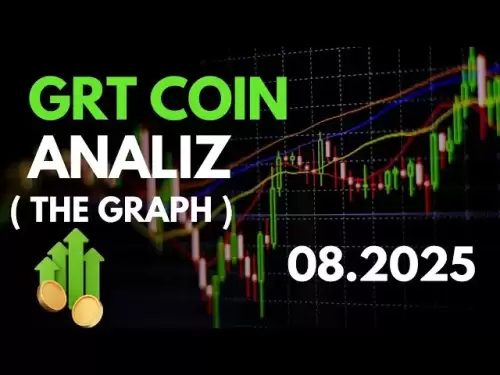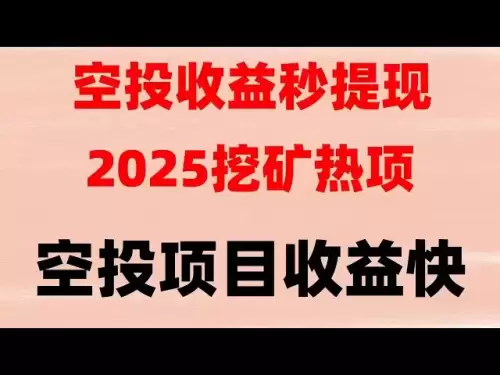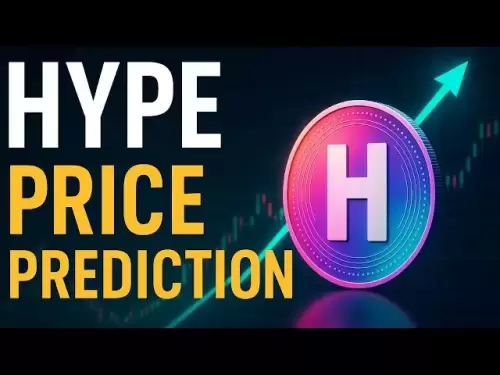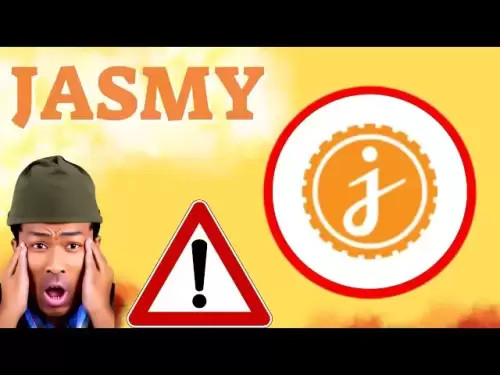-
 Bitcoin
Bitcoin $119300
2.40% -
 Ethereum
Ethereum $4254
-0.20% -
 XRP
XRP $3.184
-1.38% -
 Tether USDt
Tether USDt $1.000
0.00% -
 BNB
BNB $803.9
0.58% -
 Solana
Solana $183.1
1.50% -
 USDC
USDC $0.0000
0.01% -
 Dogecoin
Dogecoin $0.2339
-2.87% -
 TRON
TRON $0.3384
0.88% -
 Cardano
Cardano $0.8018
-0.29% -
 Hyperliquid
Hyperliquid $45.13
3.14% -
 Chainlink
Chainlink $22.10
0.96% -
 Stellar
Stellar $0.4439
-0.94% -
 Sui
Sui $3.875
-0.73% -
 Bitcoin Cash
Bitcoin Cash $570.7
0.24% -
 Hedera
Hedera $0.2589
-2.90% -
 Ethena USDe
Ethena USDe $1.001
-0.01% -
 Avalanche
Avalanche $23.83
-1.73% -
 Litecoin
Litecoin $123.8
2.61% -
 Toncoin
Toncoin $3.351
-1.13% -
 UNUS SED LEO
UNUS SED LEO $9.103
1.13% -
 Shiba Inu
Shiba Inu $0.00001356
-1.40% -
 Uniswap
Uniswap $10.93
-0.19% -
 Polkadot
Polkadot $4.057
-1.97% -
 Dai
Dai $1.000
0.01% -
 Cronos
Cronos $0.1646
4.66% -
 Ethena
Ethena $0.7974
8.11% -
 Pepe
Pepe $0.00001208
-2.89% -
 Bitget Token
Bitget Token $4.445
-1.70% -
 Monero
Monero $268.8
-2.00%
Gods Unchained (GODS) currency buying and selling tutorial
"Gods Unchained," a decentralized gaming cryptocurrency, offers gamers ownership and rewards for their in-game achievements through its GODS token, which can be acquired through gameplay, exchanges, or staking.
Dec 25, 2024 at 06:10 am
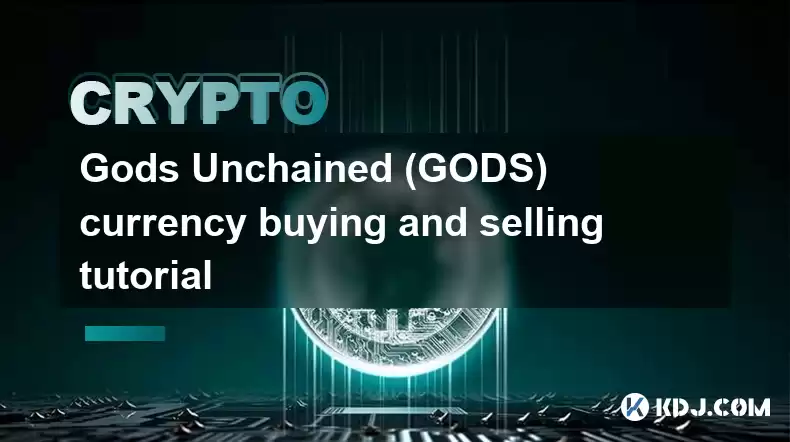
Decentralized Gaming Cryptocurrency: Gods Unchained (GODS) Trading Guide
Key Points:
- Create Cryptocurrency Wallets: Choose a reputable wallet that supports Gods Unchained tokens (GODS).
- Acquire GODS Tokens: Purchase GODS tokens from exchanges like Coinbase or Binance, or earn them by playing the game.
- Initiate Trading Transactions: Use decentralized exchanges (DEXs) like Uniswap or SushiSwap to trade GODS tokens.
- Monitor Transactions and Track Assets: Utilize block explorers or portfolio trackers to monitor trade activity and track your GODS balance.
Tutorial:
1. Creating Cryptocurrency Wallets
- Hardware Wallets: Consider Ledger or Trezor for secure offline storage.
- Software Wallets: Choose from popular options like MetaMask or Coinbase Wallet, which are accessible through your browser or mobile device.
- Mobile Wallets: Explore mobile-based wallets such as Trust Wallet or Argent, offering convenience and versatility.
2. Acquiring GODS Tokens
- Exchanges: Purchase GODS tokens directly from cryptocurrency exchanges like Coinbase, Binance, or KuCoin.
- Gameplay: Participate in Gods Unchained gameplay and earn GODS tokens as rewards for wins, tournaments, and challenges.
- Staking: Stake GODS tokens to earn additional rewards and passively grow your holdings.
3. Initiating Trading Transactions
- Decentralized Exchanges (DEXs): Trade GODS tokens directly from your wallet using DEXs like Uniswap, SushiSwap, or PancakeSwap.
- Centralized Exchanges (CEXs): Utilize CEXs like Binance or Coinbase for more convenient trading, but be aware of potential trading fees.
- Peer-to-Peer (P2P) Trading: Connect directly with other individuals to buy or sell GODS tokens on platforms like LocalBitcoins or Paxful.
4. Monitoring Transactions and Tracking Assets
- Block Explorers: Utilize block explorers like Etherscan or BscScan to track transaction details, balances, and other network information.
- Portfolio Trackers: Use portfolio tracking apps like Delta or Blockfolio to monitor multiple wallets and assets, including GODS.
- Trader Tools: Explore trading tools like TradingView or CoinMarketCap to analyze price charts and make informed trading decisions.
FAQs:
Q: What makes Gods Unchained (GODS) a unique cryptocurrency?
A: GODS is a decentralized gaming cryptocurrency tailored for the Gods Unchained collectible card game. It empowers players with ownership and rewards for their in-game achievements, fostering a truly interactive gaming ecosystem.
Q: How do I store GODS tokens securely?
A: Store GODS tokens in a reputable hardware or software wallet that supports ERC-20 tokens. Hardware wallets provide enhanced security, while software wallets offer ease of access and convenience.
Q: Where can I buy GODS tokens outside of the game?
A: You can purchase GODS tokens from cryptocurrency exchanges like Coinbase, Binance, or KuCoin. These exchanges provide a regulated and user-friendly platform for buying and selling GODS.
Q: How can I earn GODS tokens through gameplay?
A: Participate in Gods Unchained battles, tournaments, and challenges to earn GODS tokens as rewards. By actively engaging in the game, you can accumulate tokens while enjoying the gameplay.
Q: How do I connect my wallet to the Gods Unchained marketplace?
A: Visit the Gods Unchained marketplace and click on the "Connect Wallet" button. Select your preferred wallet type and follow the on-screen instructions to connect your wallet to the marketplace.
Q: How can I participate in GODS staking?
A: Stake GODS tokens to a supported staking platform or wallet. By staking your tokens, you contribute to the network's security and earn additional GODS tokens as rewards.
Disclaimer:info@kdj.com
The information provided is not trading advice. kdj.com does not assume any responsibility for any investments made based on the information provided in this article. Cryptocurrencies are highly volatile and it is highly recommended that you invest with caution after thorough research!
If you believe that the content used on this website infringes your copyright, please contact us immediately (info@kdj.com) and we will delete it promptly.
- MultiBank Group, Record Results, and the $MBG Token: A New Era?
- 2025-08-11 14:50:12
- Bitcoin FilmFest 2026: Warsaw's Unexpected Crypto-Cinema Blockbuster
- 2025-08-11 14:30:12
- MultiBank Group's Record Results and the Rise of the MBG Token: A New Era in Finance?
- 2025-08-11 14:30:12
- Solana Price, Altcoin Throne, and Layer Brett: Who Will Reign Supreme?
- 2025-08-11 14:55:17
- Cryptos to Watch in 2025: Analyst Picks & Meme Coin Mania
- 2025-08-11 15:00:13
- Dogecoin, Toncoin, and Cold Wallet: Navigating Crypto's Latest Waves
- 2025-08-11 12:30:11
Related knowledge

How to purchase Aragon (ANT)?
Aug 09,2025 at 11:56pm
Understanding Aragon (ANT) and Its PurposeAragon (ANT) is a decentralized governance token that powers the Aragon Network, a platform built on the Eth...

Where to trade Band Protocol (BAND)?
Aug 10,2025 at 11:36pm
Understanding the Role of Private Keys in Cryptocurrency WalletsIn the world of cryptocurrency, a private key is one of the most critical components o...

What is the most secure way to buy Ocean Protocol (OCEAN)?
Aug 10,2025 at 01:01pm
Understanding Ocean Protocol (OCEAN) and Its EcosystemOcean Protocol (OCEAN) is a decentralized data exchange platform built on blockchain technology,...

Where can I buy UMA (UMA)?
Aug 07,2025 at 06:42pm
Understanding UMA and Its Role in Decentralized FinanceUMA (Universal Market Access) is an Ethereum-based decentralized finance (DeFi) protocol design...

How to buy Storj (STORJ) tokens?
Aug 09,2025 at 07:28am
Understanding Storj (STORJ) and Its Role in Decentralized StorageStorj is a decentralized cloud storage platform that leverages blockchain technology ...

What is the best app to buy Nano (NANO)?
Aug 09,2025 at 03:35am
Understanding Nano (NANO) and Its Unique FeaturesNano is a feeless, instant cryptocurrency designed for fast peer-to-peer transactions. Unlike many ot...

How to purchase Aragon (ANT)?
Aug 09,2025 at 11:56pm
Understanding Aragon (ANT) and Its PurposeAragon (ANT) is a decentralized governance token that powers the Aragon Network, a platform built on the Eth...

Where to trade Band Protocol (BAND)?
Aug 10,2025 at 11:36pm
Understanding the Role of Private Keys in Cryptocurrency WalletsIn the world of cryptocurrency, a private key is one of the most critical components o...

What is the most secure way to buy Ocean Protocol (OCEAN)?
Aug 10,2025 at 01:01pm
Understanding Ocean Protocol (OCEAN) and Its EcosystemOcean Protocol (OCEAN) is a decentralized data exchange platform built on blockchain technology,...

Where can I buy UMA (UMA)?
Aug 07,2025 at 06:42pm
Understanding UMA and Its Role in Decentralized FinanceUMA (Universal Market Access) is an Ethereum-based decentralized finance (DeFi) protocol design...

How to buy Storj (STORJ) tokens?
Aug 09,2025 at 07:28am
Understanding Storj (STORJ) and Its Role in Decentralized StorageStorj is a decentralized cloud storage platform that leverages blockchain technology ...

What is the best app to buy Nano (NANO)?
Aug 09,2025 at 03:35am
Understanding Nano (NANO) and Its Unique FeaturesNano is a feeless, instant cryptocurrency designed for fast peer-to-peer transactions. Unlike many ot...
See all articles





















